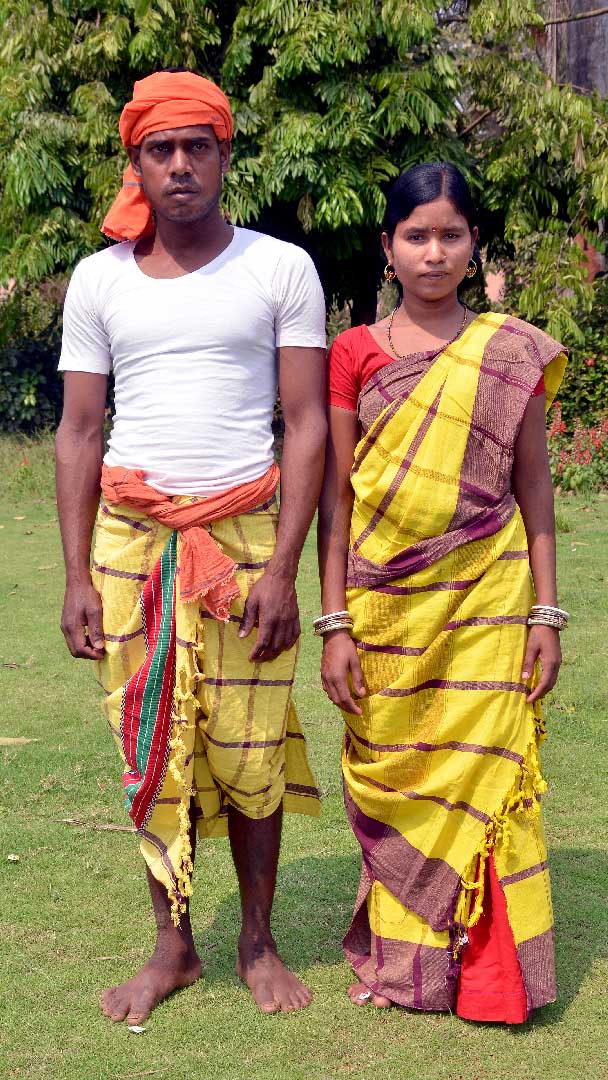TRIBES OF ODISHA
TRIBES OF ODISHA
Mankirdia
Mankria, Mankidi
Region: Mayurbhanj, Deogarh and Balasore
Population*: 203
Language: Birhor
Map: Click Here
Culture and Crafts: This small nomadic community builds leaf huts known as kumba. In the monsoon, they build earthen ridges around these huts to protect them from water seepage. The Mankirdia often travel long distances, crossing interstate boundaries into West Bengal and Jharkhand in search of game, siali creepers, minor forest produce and also for matrimonial purposes. These forays may last for up to 2 to 3 years before the group returns to their camp ground in Odisha again.
Occupation: Synonymous with the Bihor, the Mankirdia collect siali bark from the forest to make ropes and oil pressing baskets called topa which are then sold at local markets. Jute may also be used as a raw material, and date palm mats are also prepared by older women of the community. The community is famed for its skill in catching monkeys and trapping of small birds and animals which they sell locally for cash.
Video:
*Scheduled Tribes Population as per Census 2011 data. PVTGs Population as per Micro Project Survey Data, 2010
Mankirdia
Mankria, Mankidi
Region: Mayurbhanj, Deogarh and Balasore
Population*: 203
Language: Birhor
Map: Click Here
Culture and Crafts: This small nomadic community builds leaf huts known as kumba. In the monsoon, they build earthen ridges around these huts to protect them from water seepage. The Mankirdia often travel long distances, crossing interstate boundaries into West Bengal and Jharkhand in search of game, siali creepers, minor forest produce and also for matrimonial purposes. These forays may last for up to 2 to 3 years before the group returns to their camp ground in Odisha again.
Occupation: Synonymous with the Bihor, the Mankirdia collect siali bark from the forest to make ropes and oil pressing baskets called topa which are then sold at local markets. Jute may also be used as a raw material, and date palm mats are also prepared by older women of the community. The community is famed for its skill in catching monkeys and trapping of small birds and animals which they sell locally for cash.
Video:
*Scheduled Tribes Population as per Census 2011 data. PVTGs Population as per Micro Project Survey Data, 2010
Mankirdia
Mankria, Mankidi
Region: Mayurbhanj, Deogarh and Balasore
Population*: 203
Language: Birhor
Map: Click Here
Culture and Crafts: This small nomadic community builds leaf huts known as kumba. In the monsoon, they build earthen ridges around these huts to protect them from water seepage. The Mankirdia often travel long distances, crossing interstate boundaries into West Bengal and Jharkhand in search of game, siali creepers, minor forest produce and also for matrimonial purposes. These forays may last for up to 2 to 3 years before the group returns to their camp ground in Odisha again.
Occupation: Synonymous with the Bihor, the Mankirdia collect siali bark from the forest to make ropes and oil pressing baskets called topa which are then sold at local markets. Jute may also be used as a raw material, and date palm mats are also prepared by older women of the community. The community is famed for its skill in catching monkeys and trapping of small birds and animals which they sell locally for cash.
Video:
*Scheduled Tribes Population as per Census 2011 data. PVTGs Population as per Micro Project Survey Data, 2010
Mankirdia
Mankria, Mankidi
Region: Mayurbhanj, Deogarh and Balasore
Population*: 203
Language: Birhor
Map: Click Here
Culture and Crafts: This small nomadic community builds leaf huts known as kumba. In the monsoon, they build earthen ridges around these huts to protect them from water seepage. The Mankirdia often travel long distances, crossing interstate boundaries into West Bengal and Jharkhand in search of game, siali creepers, minor forest produce and also for matrimonial purposes. These forays may last for up to 2 to 3 years before the group returns to their camp ground in Odisha again.
Occupation: Synonymous with the Bihor, the Mankirdia collect siali bark from the forest to make ropes and oil pressing baskets called topa which are then sold at local markets. Jute may also be used as a raw material, and date palm mats are also prepared by older women of the community. The community is famed for its skill in catching monkeys and trapping of small birds and animals which they sell locally for cash.
Video:
*Scheduled Tribes Population as per Census 2011 data. PVTGs Population as per Micro Project Survey Data, 2010
PVTG Communities
62 Scheduled Tribes
PVTG Communities
62 Scheduled Tribes
PVTG Communities
62 Scheduled Tribes





